
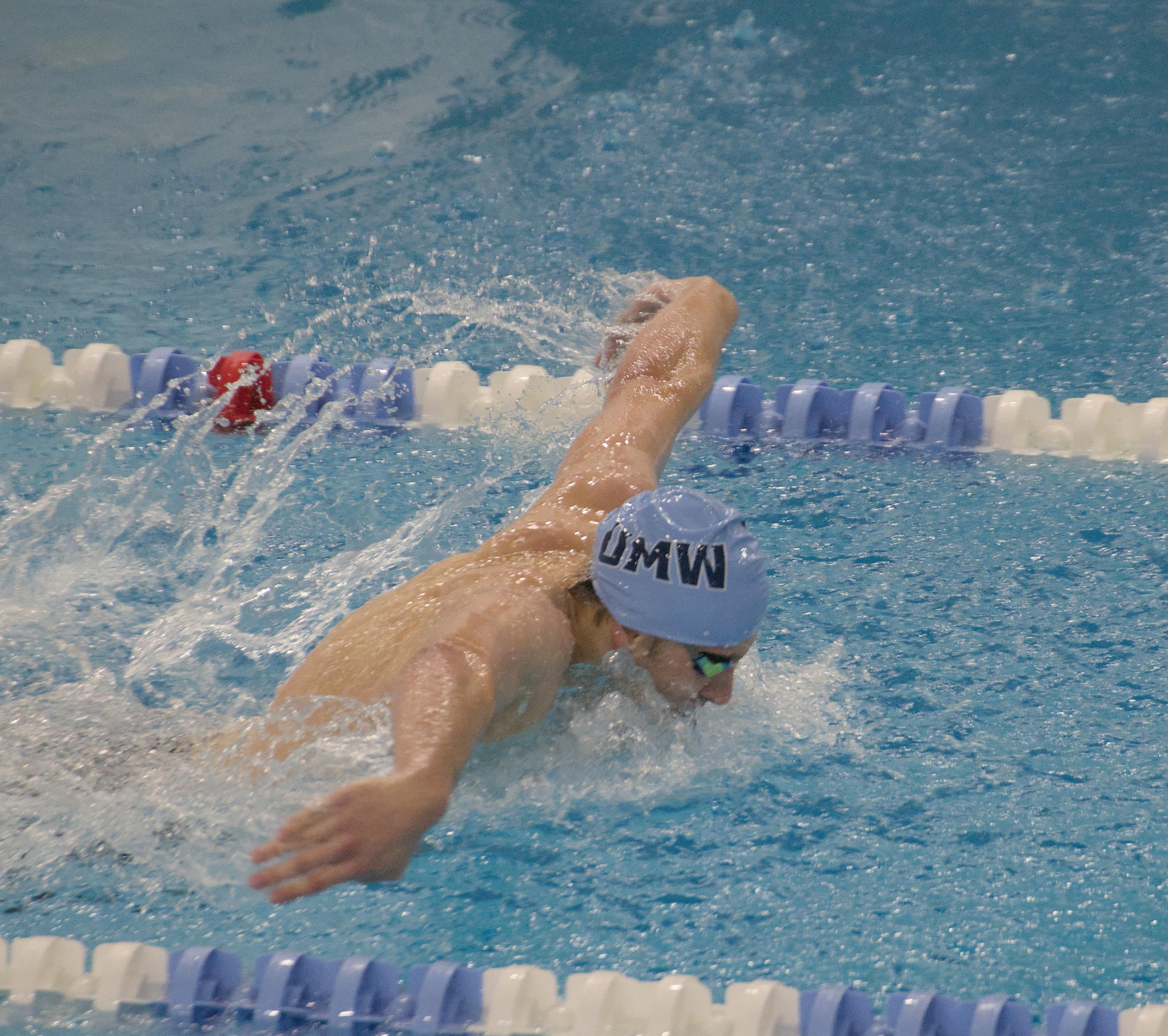
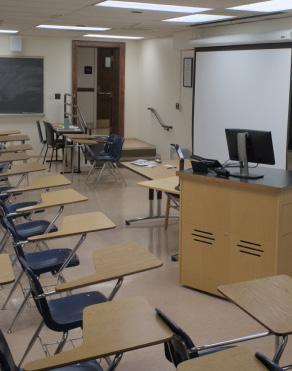
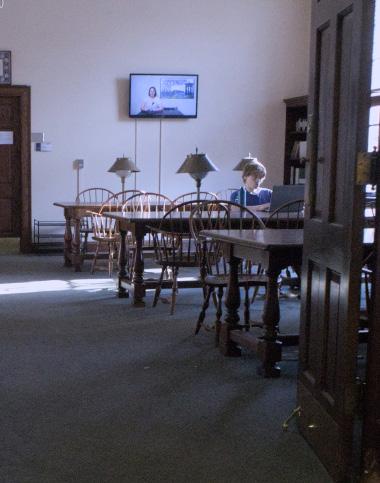
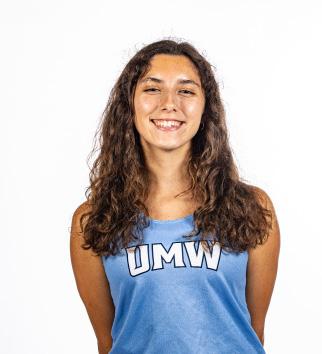






Editor-in-Chief
Callie Harkins
weeklyringer.eic@gmail.com
Executive Editor
Ky Huynh
weeklyringer.executive@gmail.com
Associate Editors
Emma Kingkeo
Grace Wagner
Thomas Jackson
weeklyringer.opinion@gmail.com weeklyringer.news@gmail.com weeklyringer.associate@gmail.com
News Editor
Meaghan Van Dyke
Opinion Editor
Ella Cordle
Life Editor
Chloe McCann
weeklyringer.online@gmail.com weeklyringer.sports@gmail.com weeklyringer.life@gmail.com
Sports Editor
Enya Cea-Lavin
Online Editor Sophia Tompkins
Photography Editors
Anna Goodman
Violet Ayers
weeklyringer.photos@gmail.com
Copy Editor
Kyra Donlon
weeklyringer.copy@gmail.com
Faculty Advisor
Sushma Subramanian
ssubrama@umw.edu
Corrections
Please report any corrections to Callie Harkins at weeklyringer.eic@gmail.com or Sushma Subramanian at ssubrama@umw.edu
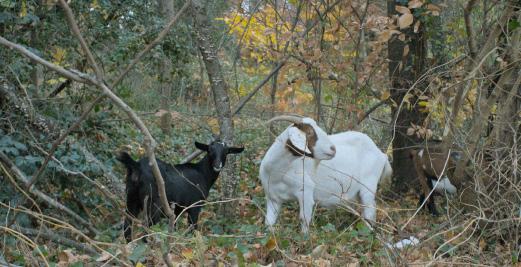
ELLA CORDLE Opinion Editor
Early this month, a herd of goats was invited to the University of Mary Washington campus to remove overgrowth and invasive species along the Sunken Road side of campus.
The dozen goats come from The Good Steward Farm in a partnership facilitated by Holly Chichester-Morby, director of the Landscape and Grounds department at UMW.
“It’s so important that young folks learn about different ways to embrace agriculture and sustainability, especially at the university level.”
- Carly Brown
“I’ve had goats on my radar for over a decade and knew I would eventually get the opportunity to bring them onto campus to help us out,” Chichester-Morby said. “These kids are here to help UMW Landscape and Grounds get a head start on the weed trees and invasive species, like English ivy, non-native honeysuckle and other overgrowth in the woods along Sunken Road.”
Carly Brown, a representative for The Good Steward Farm, expressed the company’s excitement for the partnership.
ment of the Landscape and Grounds Department.
“I find the goats to be a delight,” said Jessi LaBruno, a junior biomedical sciences major. “Several of my friends and I have raved about their use. Not only do we love watching the goats, but we love how environmentally friendly this is. Using goats instead of fossil fuel-burning equipment is such a plus.”
Other students agreed that the new initiative was a positive addition to the campus.
“I think the goats are fun. I’ve only heard positive things said about them throughout campus,” said Rae Mears, a junior biology and psychology double major. “It also makes me happy that UMW is utilizing mutually beneficial and natural ways to get rid of invasive species.”
A few students and staff members have formed attachments to the new visitors, especially a goat named Joanie.
“She is extra special—she has an extra toe on her back leg—it has its own little hoof that needs trimming,” said Chichester-Morby.
A message forwarded from Landscape and Grounds by Executive Director of University Communications Amy Jessee informed students of the goats’ presence on campus and mentioned that these goats have done similar work around the City of Fredericksburg already. The message
strongly cautioned students to leave the goats alone.
“These are working goats and should not be fed or touched,” the email read. “Viewing areas will be available around the perimeter of their grazing area, which is secured by electric fencing. Please do not come into contact with the fence or the goats.”
The lack of noise and inconvenience from traditional landscaping methods is also seen as a bonus for students.
“I do like the idea of goat landscaping as a whole. It’s way better than the loud tools they would be using otherwise and it seems like students are really enjoying seeing them,” said Celia Golden, a senior communication and digital studies and religious studies double major.
Chichester-Morby said that the goats will remain on campus for a while if everything goes to plan.
“Goatscaping is a great option for us,” she said. “I’m hoping to keep goats in the mix through the winter – we have a few decades of overgrowth to offer along that side of campus as a goat buffet. I’m hopeful that this partnership can continue for years to come.”
Goat landscaping, also known as “Goatscaping”, has grown in popularity over the last few years. The process is exactly what it sounds like—goats are hired to graze on a particular area of land where they consume overgrown or unwanted vegetation.
Hiring goats is more cost-effective than renting heavy equipment and paying for people to operate it. Goats can also work in a variety of unstable terrains that are difficult to navigate with machinery, such as the steep, hilly woods on Sunken Road.
Using goats can often be an alternative to toxic herbicides, as well. Unlike many livestock animals, goats do not produce large amounts of methane. Goats can also consume plants that are problematic to humans, such as poison ivy or invasive species. The digestive process of goats sterilizes seeds and other plant matter, which prevents invasive plants from regrowing.
Due to editor error, a photo on Page 7 of the Nov. 14 print edition was incorrectly attributed to Elizabeth Kyne. Violet Ayers took the photo.
Bell tower logo designed by Bernadette D’Auria ‘22
“We feel exceptionally positive and grateful for the opportunity to partner with UMW on a sustainable goat landscaping initiative,” she said. “It’s so important that young folks learn about different ways to embrace agriculture and sustainability, especially at the university level where problem solving and innovative ways of thinking are the order of the day.”
She continued, “It’s a symbiotic relationship—the goats get a great selection of things to munch on all winter and we get much-needed help with clearing the woods.”
Many students have echoed the excite-
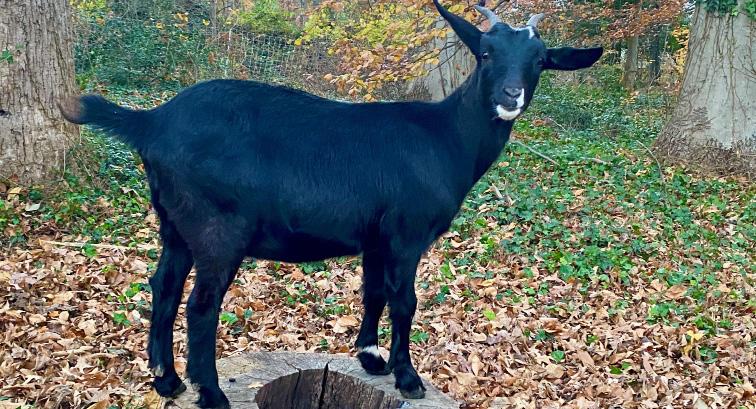
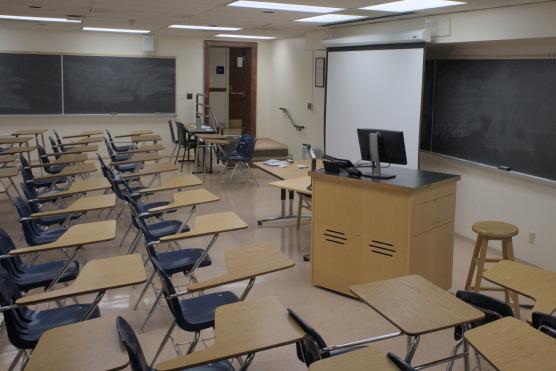
For any students dreading taking their first night class next semester, do not fret. That was my experience early in my time here, but some of the best classes I’ve taken were these dreaded evening classes and now I’ve even grown to prefer them. They might not be for everyone, but needless to say, registration is less of a pain for me after I realized how beneficial these once-weekly classes are.
Classes that meet multiple times a week are more popular among students, so they fill up before you may even have the chance to enroll. They also meet so often that they almost always have schedule conflicts with other desired classes and responsibilities. Since they only take place one day of the week, three-hour weekly classes fit better in a busy routine.
As a commuter, driving to campus and back takes me over two hours every day. This is time that could be spent studying, hanging out with friends or doing anything other than driving. I also work, as many students do. Every day that I have to commute to campus is a day I’m spending time and gas money. Five days a week on campus not only becomes impractical but can negatively affect students monetarily.
But having only one session of class a week saves time for all, not just commuters or non-traditional students. Think about how much time is spent on each class outside of instruction and planned activities. Time is spent walking to class, getting settled, recapping what was discussed last class, packing everything up at the end, going over reminders for next class and walking back to your dorm afterwards. It might not sound like a lot, but it adds up throughout the semester.
The more three-hour classes I take, the more the conventional schedule feels impractical. Condensing classes to meet only once weekly streamlines the experience of attending class, while also providing a more relaxed, student-focused environment.
With the pressure of the ticking clock and constantly changing classrooms eliminated with the longer format,
discussions go deeper and group work becomes more collaborative. Trying to get a word in during a 50 minute class can be difficult, but an extended duration makes the learning space more inclusive.
As well, the energy that professors bring to these three hour courses often feels different. Classes feel more personal rather than going through the motions, and you can tell when a professor is actually excited to be there with what they have planned. Rarely would I ever describe college as fun, but I usually enjoy these classes.
When classes aren’t chopped up into hour-long segments, professors are free to teach with more engaging
methods. Videos, short projects and Kahoots help in the monotony of long days. Given the length of the class, professors are also usually fine with students having something to eat on the side. This all makes for an experience that I actually look forward to, rather than questioning whether it’s too late to drop.
These professors also typically have their own careers outside of academia, whether they be policy analysts, playwrights or project managers. This perspective gives their courses a more job-relevant education for students who are not looking to be academics. However, this means that some of them are only available one evening a week to teach a class. Longer evening classes allow students to learn from these professors in a schedule that works feasibly with a full-time alternate career.
Now, there are some disadvantages to once-weekly classes. You are sacrificing one-seventh of your evenings. Morning people may be winding down by 7 or 8 p.m. Missing one class is the equivalent of missing two Tuesday and Thursday classes, or three Monday, Wednesday and Friday classes. Missing a once-weekly class could be detrimental when exams roll around. There is also, of course, just how long the class periods are.
However, the benefits outweigh the potential drawbacks. Three hours sounds like a lot, but it doesn’t feel that long, especially when you’re often let out early— which is unheard of in hour-long classes. In return, you get a smaller, quieter learning space. Especially in an upper-level course, the professor and the smaller group of students can delve more deeply into topics that are hard to do when trying to jog your memory on what was discussed two days before. Three-hour evening classes can thoroughly go through one topic, and be prepared for the next one the following week.
I’ve always felt a consistent rhythm to these classes that has me take more notes and pay more attention. It’s a vibe that can’t be replicated in any other class. With the focused atmosphere where everyone has time to chime in, make small talk during the halfway point break, and meet other commitments, the benefits of once-weekly threehour classes are well worth giving up one evening a week.

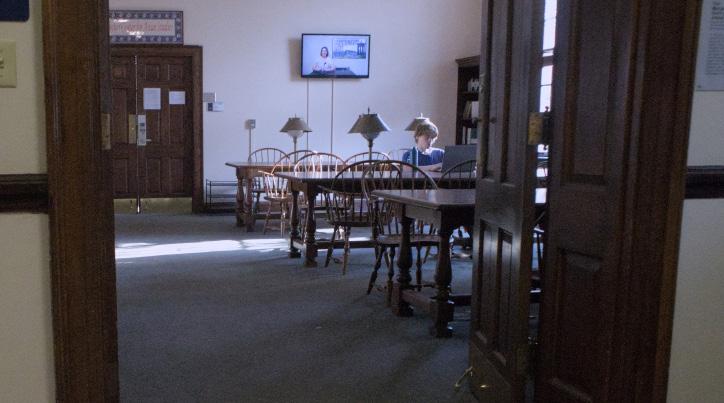
Despite being a senior in college, I’ve never really put that much thought into studying; I just rewrite my notes and hope for the best. But, as finals season approaches, I’ve found myself questioning my study techniques.
At the end of the day, I’ve always found studying to be boring and I’m constantly at war with my phone addiction when it comes to sitting down and doing it. But this semester, I’ve decided to try any trendy, creative or unconventional technique in the hopes that I’ll find something to keep me truly motivated and entertained while I study. There were some hits, some misses, but here they are: ranked from how least to most likely I am to try them again.

This app is admittedly very cute, but ultimately annoying to use. The idea of the app is fairly simple: you set a timer for how long you’ll study and once you complete your study session you’re rewarded with coins and carrots for your virtual rabbit. The coins can be used to purchase decorations and accessories for your rabbit and the more studying you do the happier your rabbit is.
The app also lets you make flash cards, to-do lists and a customizable study schedule. I found setting the timer to be an effective motivator to put down my phone and focus and the features you gain from it are worth it.
So why is it ranked so low? Insufferable advertisements. Every time I wanted to check my progress in the app or my study session ended, I had to sit through five to 10 seconds of unskippable ads.
It made the experience completely frustrating; there’s so many study timers out there, I’m not about to use the one that makes me sit through ads. As cute as it is, Study Bunny is a no-go.

This trendy method has gained some popularity on TikTok, but I found the ambiguity of it inconvenient. Fill a cup with ice and set it next to your study space and lock in until the ice melts completely. No breaks, no phone, no distractions.
Did it help me focus? Kind of. I stayed on task the whole time and it was nice to have a visual representation of how long I had been working. The problem is that I had no control over how long I had been working.
One ice cube for me took one hour and 17 minutes to melt, but this all varies depending on the size of the ice cube, the temperature of the room and how many ice cubes you use.
Part of the appeal is that you have no control over how long you study but personally I like a set timer with scheduled breaks.
This AI study assistant is trained on 10 years of student notes from over 120,000 institutions and promises more effective study resources than more general AI chatbots like ChatGPT.
When you upload your notes or readings to Studocu, it can generate a summary of the material, flashcards and practice quizzes or exams. It’s free to use and customizable to your needs.
However, I found that some of its features fall flat. It’s useful for summarizing notes and academic articles, but the practice quizzes are too easy at their best and completely inaccurate at their worst.
Definitions of terms were mismatched or incomplete and ultimately it seems pointless to use a feature that can’t even present the correct information. Can the AI give a good summary? Yes. Can it actually create effective study tools? Not so much.
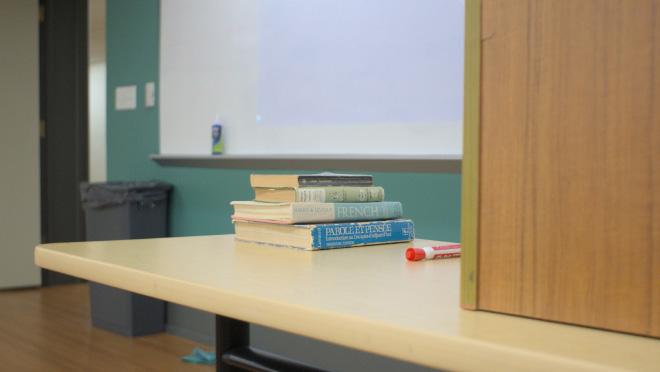
This focus app has gained some popularity on social media in recent years, ranked as one of the best productivity timers in the app store. This study timer grows a focus tree but only as long as you stay off your phone until your time runs out.
You can choose the duration of your study session as well as set a timer for breaks, boosting productivity as you’re less likely to burn out. As you use the app, you unlock different types of trees and locations, so you can grow an expansive garden the more you study.
You can also create to-do lists and add friends to join in on the experience too. I found this app to be pretty effective, especially because it prevents you from using your phone at all while the timer runs.
If you open other apps, your tree dies. Overall, the customizable timer and the fun graphics make this app worthwhile and I’m confident that I’ll implement this into my study routine.
I was so skeptical of this method when I encountered it in a random TikTok comment section, but it pleasantly surprised me with its effectiveness.
To be clear, you don’t study in pitch darkness. You just turn out all the lights, limit natural lighting and use a flashlight to illuminate whatever you need to focus on.
The reason this method works is because of the low-stimulating environment: in the dark, you can’t see any of your surroundings and can only focus on the material in front of you.
As someone who typically has to do all of her homework at night anyway, this was a great way to make use of the darkness and improve focus.
I still don’t love studying, or find it particularly enjoyable, but some of these resources were able to make the process less dull, especially during such a busy time in the semester.
GRACE WAGNER
Associate Editor
Watching Guillermo del Toro’s “Frankenstein” was an intense and surprisingly emotional experience in all the best ways. From the opening scene, I was completely pulled into the dark, gothic world he crafted.
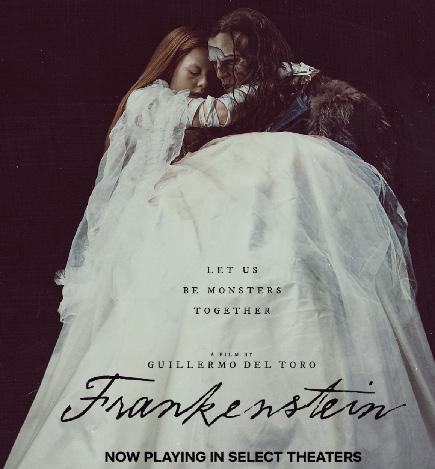
Every frame is dripping with atmosphere and layered with detail. del Toro’s sets feel almost alive. The flicker of candlelight across the lab equipment, the fog drifting lazily over the graveyards, the cluttered little corners of crumbling rooms—it all gives the impression of stepping straight into a living, breathing painting.
The performances in this movie are fantastic and they carry the film’s emotional weight.
Oscar Isaac’s Victor Frankenstein captures the character’s obsessive mania with incredible commitment. At times, he pushes the intensity to its limits, but that only makes his quieter, more vulnerable moments land harder.
Jacob Elordi, as the Creature, is easily the heart of the movie. He brings a disarming tenderness to the role. Lonely, confused, desperate to understand himself and the world. His performance makes the Creature not just sympathetic, but deeply human. For me, it’s his strongest work so far.
Mia Goth is another standout and her characters add a surprising amount of emotional texture to the film. As Elizabeth, William Frankenstein’s fiancée, she brings warmth, tension and a fragile kind of hope to the story. Goth has this unique ability to balance innocence with an undercurrent of danger and del Toro uses that quality beautifully here.

She becomes a moral anchor in Victor’s descent, someone whose presence reminds us of the life he could have chosen and whose absence magnifies the tragedy of his choices. Every scene she’s in feels more grounded, more alive. Her performance gives the film an emotional counterweight that keeps it from slipping too far into darkness.
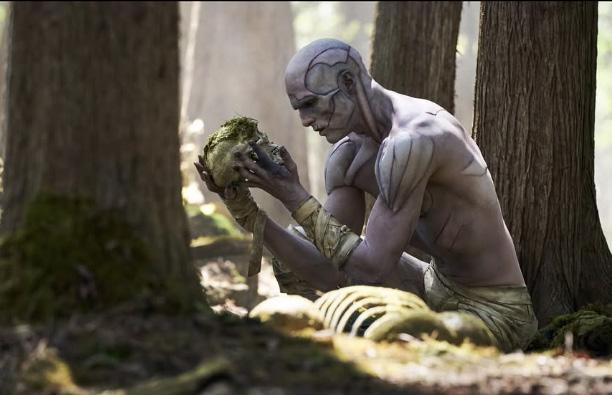
Visually, the film is breathtaking. The sets, costumes and cinematography are so rich and mesmerising that I often caught myself staring at the screen, momentarily forgetting about the plot.
The lab scenes crackle, literally and emotionally, with wild energy. The graveyards have that eerie, beautiful, almost fairytale quality that del Toro does so well. Even the small everyday spaces feel textured and real. The score ties everything together—haunting and dramatic without ever overwhelming the story.

The film isn’t without its flaws. At nearly two and a half hours, the pacing can feel slow, especially in the first half before the Creature’s creation. Some exposition feels a bit heavy-handed and there are definitely moments where silence or action would have spoken louder than the dialogue.
I was also surprised by some of the deviations from Mary Shelley’s original novel, choices that occasionally flattened Victor’s complexity rather than expanding it. This was especially surprising considering del Toro’s fascination with the infamous author herself.
But these drawbacks don’t overshadow what does work. The emotional core of the film, being Victor’s unravelling obsession, the Creature’s aching loneliness and the humanity running through all of del Toro’s monsters, hits deeply.
Goth’s presence adds warmth and emotional clarity, while Elordi brings heartbreaking sincerity and Isaac delivers a compelling portrait of ambition turned toxic.
There were scenes that genuinely made me hold my breath and moments that hit surprisingly hard. And long after the credits rolled, I found myself still thinking about the characters, especially the Creature and what he represents.
“Frankenstein” may not be perfect, but it is a visually stunning, emotionally resonant film that demonstrates why del Toro remains one of the most captivating filmmakers working today. It’s gorgeous, haunting and full of unforgettable performances. For me, it’s easily one of the standout films of the year and absolutely worth watching.
ACROSS


4. This UMW orchestra was founded in 1970, currently run by Glenn Quader
6. Where Echotrends hosted their fashion show
8. This restaurant near campus just closed
9. Res Life and ________
11. This club focuses on UMW’s past from the 18th & 19th century
14. This program encourages certain students to take more rigorous coursework
15. This club duels on Jeffy Square
Crossword by Cole Rasmussen
16. This club works to create a green space in the Bragg Hill Community Garden
17. This property was acquired by campus in 1911, it used to be an almshouse. Hint: The mountain from which Moses saw the promised land
18. Where one of the timepieces at UMW resides DOWN
1. There are 4 elected officers from each class in this club
2. One of the faculty lead musical performance groups on campus
3. National Scientific Honor Society
5. The newest additions to campus
7. The Student Led LGBTQ+ club on Campus
10. This place on campus now offers embroidery
12. This English professor focuses on the American South in the 20th & 21st Centuries
13. This club has Jam Circles in the CRUC living-rooms on Tuesdays
November 21, 2025
SOPHIA TOMPKINS & MEAGHAN VAN DYKE Online Editor and News Editor
On Nov. 14, just minutes into Act II of UMW Theatre’s production of “Godspell,” Fredericksburg Police issued a shelter in place order that included campus, forcing the cast, crew and audience to stay in Klein Theatre after the show concluded while police investigated the scene.
The student crew, led by Stage Manager, senior theatre major Katherine Farmer, worked to keep the audience occupied and maintain a safe and calm environment until the shelter in place was lifted at 10:47 p.m.—over an hour after the actors took their final bows.
Ultimately, the crew and actors participated in an impromptu Q&A to keep the audience engaged as the police continued their investigation outside.
“I tried to put myself in the audience’s shoes of like, what would I want to hear in this situation?” Farmer said.
The shelter in place order was issued in response to a shooting that took place near campus on William Street shortly before 8 p.m. that left two individuals wounded. As the actors continued their performance on stage, Farmer and Nichole Griffin, a sophomore theatre major and assistant stage manager, locked the doors and coordinated with their team to ensure a swift and safe response.
House Manager and senior theater major Liz Ashby assisted with the efforts and made contact with a UMW police officer stationed outside of duPont. While the team of students secured the building, they simultaneously kept the show running without disruption.
“I was talking to four people at one time and also calling a show,” Farmer said.
To minimize panic, the actors and audience were not made aware of the situation until after the show concluded and the team was adequately prepared to manage the crowd.

sponded calmly and thoughtfully.”
For over an hour after the anticipated end time, the 215-person audience and members of the cast and crew sheltered in Klein Theatre as they awaited the notification that it was safe to leave. Farmer and her team welcomed audience questions and facilitated an open discussion that gave insights into the production.
“I was pleased to share with them that I would not have done anything differently regarding the shelter in place. I am very proud of how they handled it.”
- Brandon Prendergast
“I wanted them to be able to stay in the moment of the show,” said Farmer. “For their protection, I didn’t want them worried about it because I was already worried for all of us.”
Shortly after the shelter in place went into effect, Brandon Prendergast, UMW Theatre’s production manager, contacted Farmer with additional information about how to mitigate chaos after the show.
“The stage managers handled the situation beautifully,” Prendergast said. “They re-
“This not only mirrors professional practice, a hallmark of our program, but is a natural extension of the work our students do every day,” said Prendergast.
According to ABC News 7, the shooting took place a few minutes before 8 p.m. on Nov. 14, a suspect described as a Black shirtless man wearing joggers fired shots on William Street, wounding two individuals who were treated at Mary Washington Hospital. The victims are in stable condition and both knew the shooter, according to Fredericksburg Police. The suspect has not been caught.
“I talked with the stage managers on Monday and we debriefed on the performances from the weekend,” said Prendergast. “I was pleased to share with them that I would not have done anything differently regarding the shelter in place. I am very proud of how they handled it.”
MEAGHAN VAN DYKE News Editor
The Crime Column is based on UMW Police reports from Nov. 12 to Nov. 19.
There has been no crime reported since The Weekly Ringer’s last publication on Nov. 14.
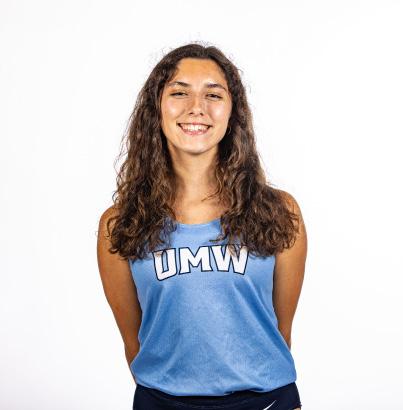
Lily Hoffman, a junior environmental sustainability and policy and political science double major, has qualified to compete in Spartanburg, S.C. on Nov. 22 at the NCAA Division III National Championships for the second time in her collegiate career.
Despite fracturing her femur in March, her 4th place win in the Coast-to-Coast Conference on Nov. 1 and 9th place in regionals this past weekend, qualified her for nationals as well as awarded her with the title of all-region honors.
Prior to her return to running in July, Hoffman used the love for her sport and teammates as motivation to continue training.
“I missed my team and sport, but also I lost a lot of endurance,” she said. “I thought I would never recover, but I started running again in July. I slowly slowly built my mileage back up and trusted the progress.”
Throughout the healing process, Hoffman’s mindset and patience helped her get to nationals as much as any physical training did.
“Having a positive mindset to combat negative thoughts is so helpful,” she said. “Telling myself to be patient and that I have control over the outcome of my race has really alleviated my racing anxiety.”
She has learned that this positive mindset has been beneficial for her racing. Not only does it allow her to prevent injuries as she addresses pain early on, it sets a clear mind for race day.
“I am taking better care of myself holistically so I can be a better runner and so I won’t get an injury again,” she said. “Also I’m really emphasizing the mental aspect of racing because it is so important to the success of your race.”

Going into this season, Hoffman worried her chances of success and hitting a personal record were slim. Despite the initial doubts, her determination led to a dominant performance that qualified her for the most competitive race in her division.
“I felt a little scared and unsure that I wasn’t going to be fast enough, but I was so
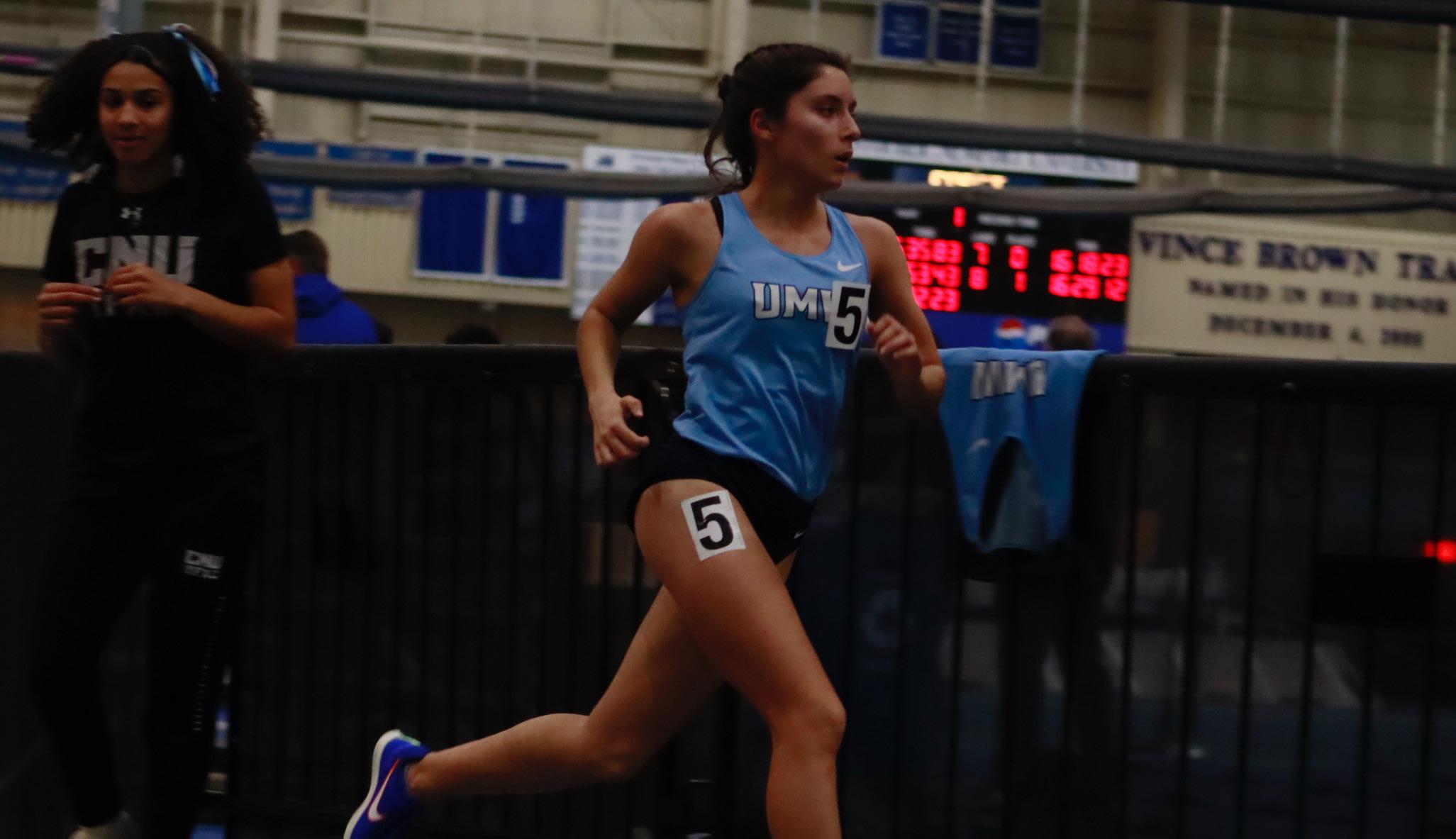
glad that I could run again because I missed it so much,” she said.
Now that Hoffman qualified for nationals, she wants to stay focused and push herself to beat her previous personal record.
“My main goal was to get here, but now that I have I want to get a PR,” she said. “I don’t have as direct of a goal for this race because there are so many fast people to compete with, but I want to make sure I can keep myself really focused during the race and push myself through the pain to get a good time.”
After successfully coming back from her injury, Hoffman has put particular emphasis on staying healthy and practicing self care.
“Hydrating and electrolytes have really helped me feel better on race days,” she said.
The road to recovery has not been linear, so making sure she keeps up on completing her workouts has helped keep her race ready.
“Getting the miles in every week and being consistent has really helped me improve my endurance,” she said.
It is clear her hard work has paid off two years in a row, which is something she says couldn’t have been done without the support of her coaches.
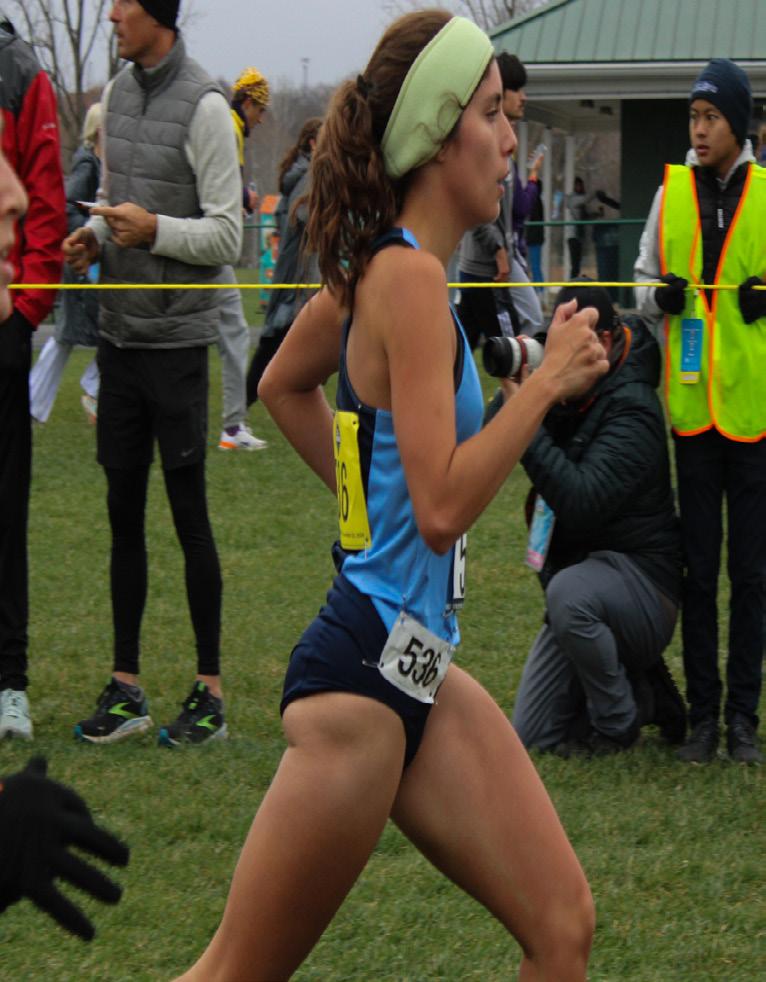
“I want to thank my coaches, Stearns, Davis and Hart, for getting me this far because they are so helpful and supportive,” Hoffman said. “Good coaches truly make the difference.”
Aside from her hard work in the cross country season, she hopes to end her junior year by placing well in conferences and make her way to nationals for the outdoor track 10k.
“I’m looking forward to outdoor track season so I can run my first 10k,” she said.

Men’s Swim and Dive (4-1)
Nov. 14 vs. St. Mary’s College Maryland (179-83)
Nov. 21-23 at Loyola University Maryland
Women’s Swim and Dive (31-1)
Nov. 14 vs. St. Mary’s College Maryland (163-99)
Nov. 21-23 at Loyola University
Maryland
Volleyball (11-23)
Nov. 1 at Salisbury University (0-3) Nov 15 at University of California, Santa Cruz (1-3)
Men’s Rugby (3-4)
Nov. 15 vs. Ohio State University (25-17)
Dec. 7 vs. St. Thomas University
Men’s Basketball (4-0)
Nov. 16 vs. Yeshiva University (90-89)
Nov. 22 vs. Carthage College
Women’s Basketball (2-3)
Nov. 14 at Chatham University (56-86)
Nov. 15 at Allegheny College (7063)
Nov. 22 vs. Shenandoah University
Games are available to watch via livestream on the UMW Athletics webpage www.eagles.com/composite